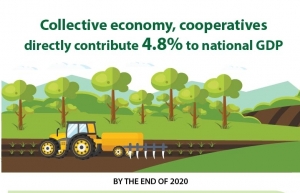Forum focuses on collective economy
 |
| Deputy Minister of Planning and Investment Do Thanh Trung |
Deputy Minister of Planning and Investment Do Thanh Trung said that one of the core tasks of Resolution 20 was to amend the 2012 Law on Cooperatives with specific policy groups to improve policies of encouraging and supporting collective economic development. These have been specified in the Cooperative Law (amended) that was passed by the National Assembly (in 2023).
"Some outstanding new points of the Law include eliminating regulations that hinder market entry, expand the market, and improve the mobilisation of capital as a motivation for cooperatives development; completing and improving the efficiency of cooperative management and administration; expanding types of collective economy and improving regulations; and improving the effectiveness and efficiency of state management in collective economy," Trung said.
Chairman of the Vietnam Cooperative Alliance Cao Xuan Thu Van said that in 2021-2023, over 71 per cent of newly established cooperatives had young founders (aged 27-40), who were enthusiastic with skills in entrepreneurship, technologies and resources such as human resources, capital, and credit.
"Some new services and commerce models that meet the capabilities and strengths of members to suit market needs have been developed to contribute to local socioeconomic development," Van said.
Minister of Agriculture and Rural Development Le Minh Hoan said that they were implementing a pilot project on building standard agricultural and forestry raw material areas for domestic consumption and export in 2022-2025 across 14 provinces.
"In 2022, in 13 provinces with raw material areas, localities have supported the establishment of 70 new agricultural cooperatives and 1 union of cooperatives, raising the total number of agricultural cooperatives in raw material areas in 13 provinces to 320 cooperatives," Hoan said.
"The Ministry of Agriculture and Rural Development is currently developing a project on 1 million ha of high-quality rice in the Mekong River Delta that will support 937 cooperatives participating in the rice chain in the region."
 |
Shawn Steil, Canadian Ambassador to Vietnam said that cooperatives were an important vehicle for mobilising entrepreneurship and ensuring on one is left behind.
"Cooperatives generate jobs and growth. For example, in 2021, there were more than 5,600 active non-financial cooperatives in Canada. They held $47.3 billion in total assets, employed 100,755 people and paid $2.7 billion in salaries and wages," he said.
The ambassador pointed out some witnessed challenges to the cooperative sector globally and in Vietnam related to access to capital; building and maintaining good infrastructure (whether it is processing, storage or distribution); scaling up to remain competitive and sustainable; and keeping the membership truly engaged.
"Legal recognition of the socioeconomic value of cooperatives is crucial. It is really well accomplished in Vietnam with the issuance of Resolution 20 and revision of the 2023 Law on Cooperative," he said.
He also suggested lower corporate income tax rates for cooperatives, and mandatory contributions to a social fund or cooperative federations to provide services and capital to cooperatives to enable their success and increase their impact.
Deirdre Ni Fhalluin, Irish Ambassador to Vietnam, recognised the importances of cooperatives and the need to provide a modern legal framework to help the cooperative sector grow.
"At the end of 2022, the Irish government agreed to commence drafting a new cooperative societies bill to modernise existing provisions for this sector. This bill - when finalised - aims to introduce modern corporate governance, financial reporting and compliance requirements, thereby making cooperatives more attractive to investors," she said.
Prime Minister Pham Minh Chinh said that Vietnam's collective economic sector had not yet developed as expected and required.
"The growth rate of this sector is only half the overall growth rate of the economy. The proportion of the collective economy sector and cooperatives in the country's GDP is decreasing on-year, (from 8.06 to 3.62 per cent in 2001-2020," the PM warned.
He said that the collective economy and cooperatives must change drastically in both thinking and action with the application of modern sci-tech, green transformation, digital transformation, circular economy, knowledge economy, and sharing economy.
All quantity and quality of members and workforce; the efficiency of capital use, labour productivity, linkage in value chains, supply chains, and production chains should be improved.
Therefore, the PM requested the Ministry of Planning and Investment to complete the master plan on collective economy development in 2026-2030.
The State Bank of Vietnam will have to research and improve regulations on internal lending in cooperatives and cooperative unions to support employees and cooperative members in eliminating 'black' credit in agricultural areas.
 | Collective economy, cooperatives directly contribute 4.8pct to national GDP (Infographics) The collective economy and cooperative contribute directly 4.8 percent to the national Gross Domestic Product (GDP) |
 | Cooperatives the “only way forward” for efficient growth New collective and cooperative economic models applying Industry 4.0 and international economic integration are being strongly developed to increase their contribution to the country’s GDP. |
 | Cooperatives receive support to adopt e-commerce E-commerce is widely considered an effective and sustainable solution to help cooperatives improve their competitiveness, and boost production and exports, but the number of cooperatives that have gone online remains modest, prompting the Vietnam Cooperative Alliance (VCA) to support them in this regard. |
 | NA deputies bemoan slow lending plans The slow deployment of a pro-business monetary policy is making it hard to provide timely assistance for enterprises, cooperatives, and household businesses. |
What the stars mean:
★ Poor ★ ★ Promising ★★★ Good ★★★★ Very good ★★★★★ Exceptional
 Tag:
Tag:
Related Contents
Latest News
More News
- PM outlines new tasks for healthcare sector (February 25, 2026 | 16:00)
- Ho Chi Minh City launches plan for innovation and digital transformation (February 25, 2026 | 09:00)
- Vietnam sets ambitious dairy growth targets (February 24, 2026 | 18:00)
- Masan Consumer names new deputy CEO to drive foods and beverages growth (February 23, 2026 | 20:52)
- Myriad risks ahead, but ones Vietnam can confront (February 20, 2026 | 15:02)
- Vietnam making the leap into AI and semiconductors (February 20, 2026 | 09:37)
- Funding must be activated for semiconductor success (February 20, 2026 | 09:20)
- Resilience as new benchmark for smarter infrastructure (February 19, 2026 | 20:35)
- A golden time to shine within ASEAN (February 19, 2026 | 20:22)
- Vietnam’s pivotal year for advancing sustainability (February 19, 2026 | 08:44)




























 Mobile Version
Mobile Version